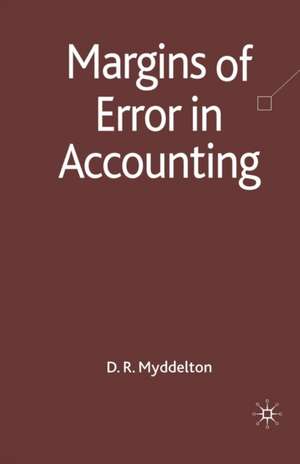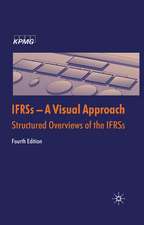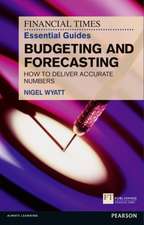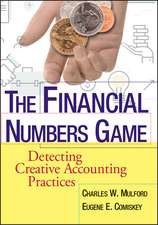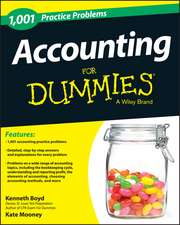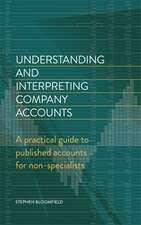Margins of Error in Accounting
Autor D. Myddeltonen Limba Engleză Paperback – 15 ian 2009
| Toate formatele și edițiile | Preț | Express |
|---|---|---|
| Paperback (1) | 379.86 lei 43-57 zile | |
| Palgrave Macmillan UK – 15 ian 2009 | 379.86 lei 43-57 zile | |
| Hardback (1) | 383.93 lei 43-57 zile | |
| Palgrave Macmillan UK – 15 ian 2009 | 383.93 lei 43-57 zile |
Preț: 379.86 lei
Nou
Puncte Express: 570
Preț estimativ în valută:
72.68€ • 76.09$ • 60.14£
72.68€ • 76.09$ • 60.14£
Carte tipărită la comandă
Livrare economică 07-21 aprilie
Preluare comenzi: 021 569.72.76
Specificații
ISBN-13: 9781349305391
ISBN-10: 1349305391
Pagini: 185
Ilustrații: XIV, 171 p. 3 illus.
Dimensiuni: 140 x 216 x 10 mm
Greutate: 0.22 kg
Ediția:1st ed. 2009
Editura: Palgrave Macmillan UK
Colecția Palgrave Macmillan
Locul publicării:London, United Kingdom
ISBN-10: 1349305391
Pagini: 185
Ilustrații: XIV, 171 p. 3 illus.
Dimensiuni: 140 x 216 x 10 mm
Greutate: 0.22 kg
Ediția:1st ed. 2009
Editura: Palgrave Macmillan UK
Colecția Palgrave Macmillan
Locul publicării:London, United Kingdom
Cuprins
List of Tables List of Figures Preface Acronyms INTRODUCTION Accounting rules Inputs and outputs Is too much expected of accounts? Quantifying margins of error Causes and types of error Simple mistakes PART II: THE INTERIM-NESS OF ACCOUNTS Introduction Fixed assets – tangible Depreciation General Different methods Different assumptions about life and residual value Capitalising interest Current assets Stocks and work in progress Long-term contracts Stocks Trade debtors Liabilities Current Longer-term Sales revenue Revenue investments Research and development Staff training Advertising Taxation Current Deferred tax Conclusions PART III: BASIS OF MEASUREMENT The purpose of accounts Realised and unrealised profits Technical aspects of Current Value accounting Operating gains and holding gains Replacement cost versus realisable value Implications of Current Value accounting Margins of error in 'current value' Possible impact on reported profits Revaluation of tangible fixed assets Goodwill Cash and liquid resources Executive stock options Provision for pensions Discounting long-term liabilities Derivatives Conclusions PART IV: THE UNIT OF ACCOUNT Money and inflation Money Modern UK inflation The unit of account Impact on accounts Which index to use? Constant Purchasing Power accounting Overview Losses (and gains) in respect of monetary assets (and liabilities) Fixed assets and depreciation Comparisons over time Lucas Industries plc. CPP accounts 1969-1994 Foreign currencies Conclusions PART V: ACCOUNTING PROFIT VERSUS ECONOMIC INCOME Economic income Capitalising future income Ex ante and ex post income Historical cost accounting profit versus economic income Interest on equity capital Calculating the cost Charging notional interest PART VI: CREATIVE ACCOUNTNG What is 'creative accounting'? Incentives and pressures on managers Profit and loss account Overstating profits Understating profits Balance sheet Overstating net assets Understating net assets Presentation andtrends Politics Fraud Non-profit and small entities Conclusions PART VII: SPURIOUS ACCURACY Accounting The appearance of precision Preparers' exaggeration Calendar problems Finance Stock market level Earnings per share Cost of capital Valuing equity shares Measuring gearing Economics Prices National income Miscellaneous PART VIII: NEAR ENOUGH Accounting Sports Football Cricket Other sports Weather Political elections Miscellaneous Weights and measures Transport Medicine Cooking Back to accounting PART IX: CONCLUSIONS Introduction Interim-ness Basis of measurement The unit of account Accounting profit versus economic income Creative accounting Spurious accuracy Near enough Misreporting profit Preventing avoidable error Bibliography Glossary Name Index Subject Index
Notă biografică
DAVID R. MYDDLETON has been Professor of Finance and Accounting at the Cranfield School of Management, UK since 1972 (Emeritus since retiring in 2005). He has written books on the British tax system, inflation accounting and accounting standards. He is Chairman of the Trustees of the Institute of Economic Affairs.
